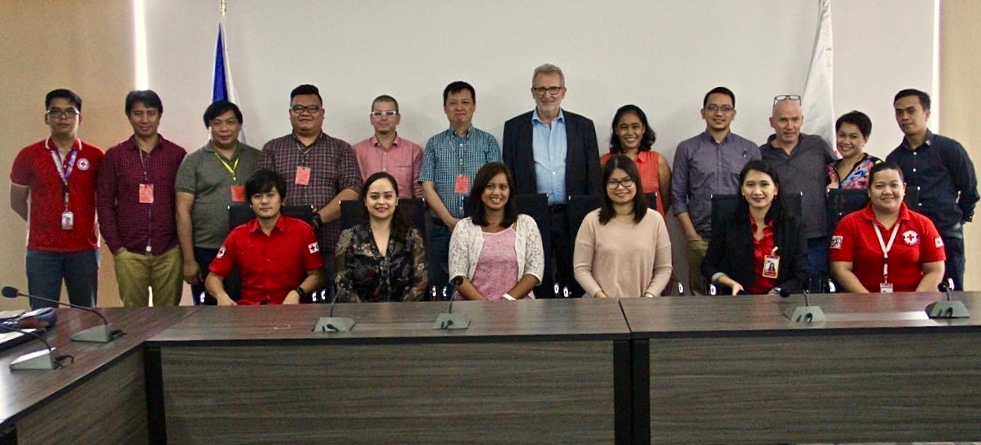
- This event has passed.
Technical working group on internal housing, land and property (HLP) strategy draft | 11 October 2017 | the Philippines
11 October , 2017 8:00 am - 5:00 pm UTC+7
Housing Land and Property Rights in Disasters: Red Cross Strategy Development in Philippines
Sustainable and meaningful shelter assistance in the humanitarian context is not only about providing a roof over one’s head. It is also about making sure that the assistance places displaced people in a much-improved housing situation than they were originally in or, at the very least, in a position that is not worse off than before they were hit by a disaster. Beyond ensuring safe structural shelter design, a humanitarian organization aiming to achieve this goal will have to consider and be responsive to the basic housing, land and property rights of disaster affected persons.
On 11 October 2017, the Philippine Red Cross (PRC) held a technical working group meeting to seek feedback on its draft internal housing, land and property (HLP) strategy. This strategy seeks to guide PRC in its humanitarian shelter and settlement assistance. The contents of the draft strategy are based on inputs received from shelter practitioners’ last year, which identified the need for greater preparedness and advocacy to ensure that disaster affected populations will enjoy similar or increased land tenure security after a disaster, fulfilling their human right to adequate housing.
HLP Partners
The Philippine Red Cross invited its partners, American Red Cross (AmCross) and Initiatives for Dialogue and Empowerment through Alternative Legal Services, Inc. (IDEALS), and listened to their sharing of good practices and lessons learned in the implementation of a legal assistance project for its shelter beneficiaries in Tacloban. This is part of PRC’s Typhoon Haiyan humanitarian assistance initiative in partnership with AmCross. Other partners in the consultation included the International Federation of Red Cross and Red Crescent Societies, the International Committee of the Red Cross and the Netherlands Red Cross.
Overview of the PRC HLP Strategy
The draft housing land and property strategy for PRC proposes the following: (1) improving internal PRC processes that will ensure its shelter and settlements programming satisfies the beneficiaries’ right to adequate housing, and is aligned with the Movement’s shelter and settlement aims—i.e. rapid tenure assessment (based on these Guidelines), due diligence, stakeholder mapping, HLP legal referral pathways, and more flexible shelter beneficiary and assistance options; and (2) advocacy for the improvement of external shelter and settlement public policies and ensuring better implementation of these. Once finalized and approved after a feedback process, the internal HLP strategy should be operational at the preparedness, response, and recovery stages of shelter programming. It mostly applies to a natural disaster setting but the working group will look into how this can be integrated in a conflict context.
Lessons Learned from the Legal Assistance Project
The HLP situation in the Philippines, like in many other countries, is complex. This impacts on PRC’s shelter assistance programming. IDEALS presented an informative “national housing snapshot”, and an overview of the land administration and management in the country. These focused on overlapping mandates and conflicting laws, as well as protracted procedural requirements, including the impact of the No Build Zone Policy implemented during the Typhoon Haiyan recovery phase. Given this background, it was inherently difficult to implement the legal assistance for Tacloban shelter beneficiaries. However, after interviewing 1,195 shelter beneficiaries and 261 landowners, the team was able to secure 432 land tenure documents (e.g. lease documents, usufruct agreements, agricultural leasehold contract), which was above the targeted number.
The IDEALS team shared that HLP legal assistance, particularly due diligence and land security interventions, would be best done prior to any humanitarian shelter intervention. They also stressed the importance of engaging with landowners in this type of legal assistance project early on, given that their cooperation will make or break the success of procuring land tenure documents for shelter beneficiaries.
In addition, IDEALS shared its ongoing legal assistance support for the displaced in Marawi City. The armed conflict which had just formally ended has resulted in a high number of internally displaced persons. As part of its humanitarian and development interventions in Marawi, PRC is expected to provide shelter assistance, and the HLP strategy will be able to provide crucial guidance in this.
The lessons learned from the legal assistance project in Tacloban will form part of the legal assistance / referral pathways component of the proposed PRC HLP strategy. The second draft of the strategy will be further reviewed by the Philippines Red Cross technical working group later in the year.
For more information, contact: Gabrielle Emery at gabrielle.emery@ifrc.org
![]()


